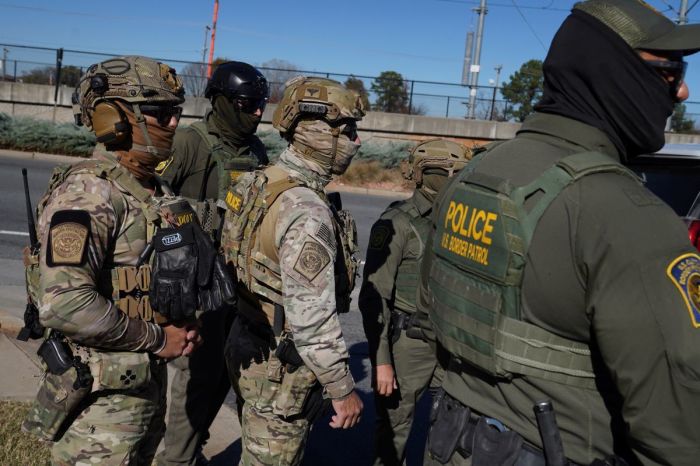
Amid an immigration enforcement crackdown in Charlotte, North Carolina, U.S. Customs and Border Patrol agents conducted an operation Saturday that resulted in a church's cleaning crew fleeing the property and one person with a final order of removal being detained.
In a statement to The Christian Post, Public Affairs Assistant Secretary Tricia McLaughlin said that CBP agents "were conducting an immigration enforcement operation" on Saturday "when they encountered an individual, who immediately fled toward the grounds of a church."
"During the pursuit, a cleaning crew who were on the grounds also began to flee in different directions," McLaughlin stated. "Agents apprehend a member of the cleaning crew, an illegal alien from El Salvador who was issued a final order of removal from a judge over a year ago."
The incident had garnered considerable attention through The Charlotte Observer, which reported that between 15 and 20 cleaning crew members fled the church as a result.
In addition to the cleaning crew, there were several women and children within the church who, The Observer reports, "sobbed as they wondered whether their loved ones had been taken."
One of the crew members, 15-year-old Miguel Vazquez, was friends with the person who officials apprehended. Unlike the arrested person, Vazquez is a United States citizen.
"I thought, 'Wait, why am I running? I'm a citizen,'" Vazquez told the newspaper. "We thought church was safe and nothing [is going to] happen … but it did happen."
The church, which was not named by The Observer or in the DHS statement, has suspended worship services and additional yard work until members feel safe again, according to Vazquez.
The incident is part of a broader series of federal immigration enforcement actions in the Charlotte area, an effort known as "Operation Charlotte's Web."
In a statement released Monday, DHS reported that the two-day operation resulted in the arrest of over 130 individuals who had entered the country illegally, including 44 violent criminals.
"There is absolutely no excuse to continue allowing criminal illegal aliens to terrorize our American communities," stated DHS. "These are violent assailants, gang members, and repeat offenders who have zero regard for the rule of law in our country."
Others protested the operation, believing that the immigration enforcement action terrorized many legal immigrants and citizens, with local businesses being hit with drops in customers.
"I'm heartbroken, really," said laundromat owner David Rebolloso, who was born in Texas to a Mexican father, told The Guardian. "People are nervous just because of the tactics. Even me. I'm brown-skinned and I'm an American citizen and I'm a [military] vet. But here I'm thinking: should I be carrying my passport with me?"
In January, DHS announced the rescinding of a policy enacted in 2011 during the Obama administration banning immigration law enforcement operations from "sensitive" areas, including churches and schools. At the time, the agency said that criminals "will no longer be able to hide in America's schools and churches to avoid arrest" and accused the Biden administration of abusing the humanitarian parole program "to indiscriminately allow 1.5 million migrants to enter our country."
Multiple legal challenges have been filed against the Trump administration's policy of allowing federal agents to conduct immigration enforcement operations on the properties of churches, including one in July by a coalition of progressive Christian groups and denominations.
"Raids in churches and sacred spaces violate decades of norms in both Democratic and Republican administrations, core constitutional protections, and basic human decency," said Skye Perryman, president and CEO of Democracy Forward, a progressive legal group representing the Christian groups in their lawsuit filed in July.
"Faith communities should not have to choose between their spiritual commitments and the safety of their congregants."
In another case, Judge Dabney Friedrich of the U.S. District Court in Washington rejected a request for a preliminary injunction by more than two dozen Christian and Jewish organizations. Friedrich, a Trump appointee, ruled in April, about 10 weeks after the policy went into effect, that very few immigration actions occur around religious sites and that the evidence doesn't suggest "that places of worship are being singled out as special targets."